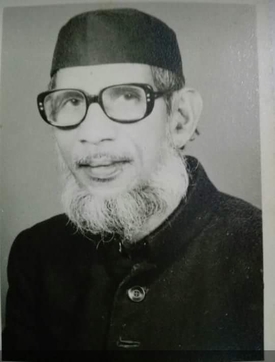Related Research Articles

Mahmud Hasan Deobandi was an Indian Muslim scholar and an activist of the Indian independence movement, who co-founded the Jamia Millia Islamia university and launched the Silk Letter Movement for the freedom of India. He was the first student to study at the Darul Uloom Deoband seminary. His teachers included Muhammad Qasim Nanautawi and Mahmud Deobandi, and he was authorized in Sufism by Imdadullah Muhajir Makki and Rashid Ahmad Gangohi.

Muhammad Qasim Nanautavi was an Indian Sunni Hanafi Maturidi Islamic Scholar, theologian and a Sufi who was one of the main founders of the Deobandi Movement, starting from the Darul Uloom Deoband.
Muhammad Yaqub Nanautawi (1833–1884) was an Indian Islamic scholar, and one of the earliest teachers of Islamic Madrassa in Deoband, famously called Darul Uloom Deoband in India. He was the first principal of Darul Uloom Deoband.
Abul Wafa Sanaullah Amritsari was a British Indian, later Pakistani, Muslim scholar and a leading figure within the Ahl-e-Hadith movement who was active in the Punjab city of Amritsar. He was an alumnus of Mazahir Uloom and the Darul Uloom Deoband. He was a major antagonist of Mirza Ghulam Ahmad and the early Ahmadiya movement. He served as the general secretary of the All India Jamiat-i- Ahl-i-Hadith from 1906 to 1947 and was the editor of the Ahl-e-Hadees, a weekly magazine.
Majid Ali Jaunpuri was an Indian Sunni Islamic scholar and a rationalist thinker. He was mainly known for his work in the subjects of logic and hadith. He was an alumnus of the Darul Uloom Deoband and is reported to have written a marginalia to Sunan Abu Dawud and Jami` at-Tirmidhi.
Syed Fakhruddin Ahmad (1889-1972) was an Indian Sunni Muslim scholar and jurist who served as the Principal of Madrasa Shahi, and the sixth President of Jamiat Ulama-e-Hind. He was a professor of hadith at the Darul Uloom Deoband.

Nizāmuddīn Asīr Adrawi was an Indian Sunni Muslim scholar, biographer, historian and author in the Urdu language. He established Madrassa Darus Salam in Adari and served as Officer In Charge of Jamiat Ulama-e-Hind in Lucknow from 1974 to 1978.
Izaz Ali Amrohi was an Indian Islamic scholar who served as the second and ninth Grand Mufti of the Darul Uloom Deoband. His book Nafahtul Arab is taught in madrassas including the Darul Uloom Deoband.
Madrassa Shahi is an Islamic seminary in Moradabad, Uttar Pradesh. It was established in 1879 by the poor Muslims of Moradabad under the supervision of Islamic scholar, Muhammad Qasim Nanautawi, who also established the Darul Uloom Deoband. This started as Madrasatul Ghuraba, but gained recognition as Madrasa Shahi. Its first principal was Ahmad Hasan Amrohi.
Zayn al-Abidin Sajjad Meerthi (1910–1991) was an Indian Sunni Muslim scholar and historian and head of the Islamic studies department of Jamia Millia Islamia. His book Tarikh-e-Millat is required reading in the syllabus of Darul Uloom Deoband and in madrasas affiliated with it.
Hafiz Muhammad Ahmad (1862-1930) was an Indian Muslim scholar, who served as the Vice Chancellor of the Darul Uloom Deoband for thirty five years. He was the Grand Mufti of the Hyderabad State from 1922 to 1925.
Aziz-ul-Rahman Usmani was an Indian Sunni Muslim scholar who served as first Grand Mufti of Darul Uloom Deoband. He is best known for his Fatawa Darul Uloom Deoband. His brother was Shabbir Ahmad Usmani.

Uzair Gul Peshawari was an Islamic scholar and an activist of the Indian freedom struggle against British rule who actively participated in the Silk Letter Movement. He was an alumnus of the Darul Uloom Deoband and served as the head-teacher of Madrasa Rahmania in Roorkee.
Sayyid Muhammad Abid (1834–1912) was an Indian Muslim scholar who co-founded Darul Uloom Deoband. He was the Vice Chancellor of Darul Uloom Deoband for three times.

Mamluk Ali Nanautawi was an Indian Sunni Muslim scholar who served as the Head Teacher of Arabic language at the Zakir Husain Delhi College. His notable students include Muhammad Qasim Nanautawi, Rashid Ahmad Gangohi and Muhammad Yaqub Nanautawi.
Muhammad Sahool Bhagalpuri was an Indian Muslim scholar and jurist who served as the fifth Grand Mufti of Darul Uloom Deoband.
Asghar Hussain Deobandi was an Indian Sunni Muslim scholar who co-founded Madrasatul Islah.
The Siddiqi family of Nanauta are the descendants of the first Rashidun Caliph, Abu Bakr, based primarily in the town of Nanauta in India. The notable people of this family include Mamluk Ali Nanautawi, Muhammad Qasim Nanautawi, Muhammad Yaqub Nanautawi, Muhammad Tayyib Qasmi and Muhammad Salim Qasmi.
Ahmad Hasan Amrohi was an Indian Muslim scholar and freedom struggle activist who served as the first principal of Madrasa Shahi in Moradabad. He was an alumnus of Darul Uloom Deoband and among the founding members of Mahmud Hasan Deobandi's Thamratut-Tarbiyat. He was an authorized disciple of Imdadullah Muhajir Makki.
References
- ↑ David Emmanuel Singh, The Independent Madrasas of India: Dar al-'Ulum, Deoband and Nadvat al-'Ulama, Lucknow (PDF), Oxford Centre for Mission Studies, archived from the original (PDF) on 24 November 2020, retrieved 1 August 2020
- ↑ Metcalf, Barbara (1978). "The Madrasa at Deoband: A Model for Religious Education in Modern India". Modern Asian Studies. 12 (1): 111–134. doi:10.1017/S0026749X00008179. JSTOR 311825. S2CID 145793477.
- 1 2 Asir Adrawi. Tazkirah Mashahir-e-Hind: Karwan-e-Rafta (in Urdu) (2 April 2016 ed.). Deoband: Darul Moallifeen. p. 229.
- ↑ Rizwi, Syed Mehboob. Tarikh Darul Uloom Deoband[History of the Dar al-Ulum Deoband]. Vol. 1. Translated by Murtaz Husain F Quraishi (1980 ed.). Deoband: Darul Uloom Deoband. p. 118.
- 1 2 Asir Adrawi. Hazrat Shaykhul Hind: Hayat awr Karname[Shaykhul Hind: Life and Works] (in Urdu) (April 2012 ed.). Darul Uloom Deoband: Shaykhul Hind Academy. p. 39.
- ↑ Parwez, Shahid (1999). "Mahmud Hasan (18S1-1920)". The Deoband movement till 1920 the ideological and institutional dimensions (PhD). Department of History, Aligarh Muslim University. p. 111. hdl:10603/52429 . Retrieved 1 August 2020.
- ↑ Ashiq Ilahi Bulandshahri. "The Great Scholar, Mulla Mahmud Deobandi". al-ʿAnāqīd al-Ghāliyah min al-Asānīd al-ʿĀliyah (in Arabic). Karachi: Maktaba Shaykh. p. 41.